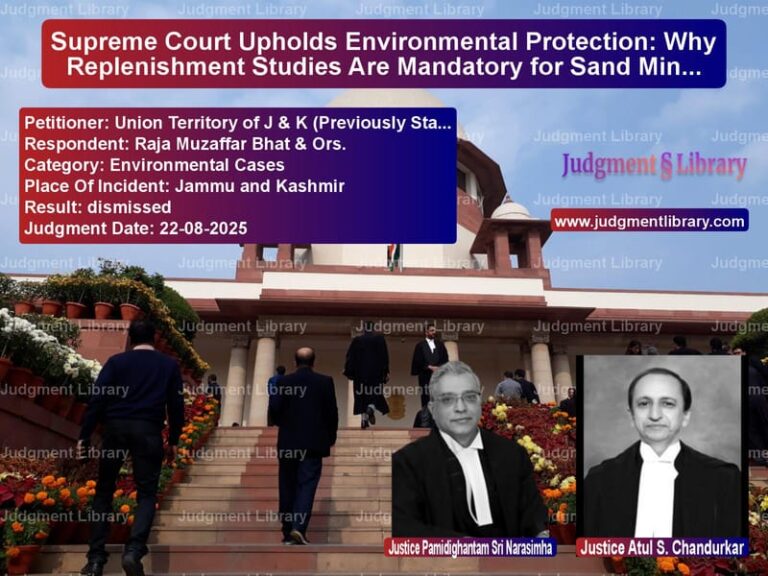Supreme Court Reduces Death Sentence to Life Imprisonment: A Landmark Judgment
The Supreme Court of India, in a landmark judgment, commuted the death sentence of the petitioner, Chhannu Lal Verma, to life imprisonment. The case was a significant review of the application of the ‘rarest of rare’ doctrine in capital punishment jurisprudence in India. The judgment has reinforced the principle that courts must meticulously analyze mitigating factors before awarding the death penalty.
Background of the Case
The petitioner was convicted for the brutal murder of his family members. The trial court sentenced him to death, and the High Court upheld the verdict. The primary question before the Supreme Court was whether the petitioner deserved the death penalty or if life imprisonment was a more appropriate sentence.
Petitioner’s Arguments
The counsel for the petitioner presented the following arguments:
- The sentencing courts failed to adequately consider mitigating factors, such as the petitioner’s socio-economic background and psychological condition.
- The petitioner had no prior criminal history and had shown good behavior during his time in custody.
- The crime did not meet the stringent ‘rarest of rare’ criteria required to justify capital punishment.
- The petitioner was capable of reformation and rehabilitation, as suggested by psychological evaluations.
Respondent’s Arguments
The State of Chhattisgarh defended the death sentence, arguing:
- The nature of the crime was heinous and demonstrated extreme depravity.
- The trial court and High Court had correctly applied the ‘rarest of rare’ doctrine.
- The crime had caused immense societal outrage, warranting the severest form of punishment.
Judicial Observations
The Supreme Court, in its judgment, referred to various precedents and reaffirmed the principle that the death penalty should be awarded only in the rarest of rare cases. The Court observed:
“The imposition of the death penalty must be based on a careful analysis of both aggravating and mitigating circumstances. The scope of reformation and rehabilitation must always be assessed before sentencing an individual to death.”
The Court also noted that in many cases, the psychological evaluation of convicts on death row had been inadequate or non-existent. It emphasized the need for a scientific and well-documented approach to sentencing.
Mitigating Factors Considered
- The petitioner had spent a significant period in incarceration, during which he exhibited no violent behavior.
- There was no evidence suggesting he posed a continuing threat to society.
- The possibility of reformation, as per psychological evaluations, was not ruled out.
- Previous Supreme Court rulings indicated that life imprisonment without the possibility of remission could be a viable alternative to the death penalty.
Final Judgment
After a thorough review of the case, the Supreme Court ruled in favor of commuting the petitioner’s death sentence to life imprisonment without the possibility of remission. The Court held:
“The objective of the penal system must be reformative rather than retributive. The present case, though grave in nature, does not warrant the irreversible punishment of death.”
The judgment aligns with the evolving jurisprudence on capital punishment in India, where courts have increasingly emphasized the importance of life imprisonment as an alternative to the death penalty.
Impact of the Judgment
This ruling reinforces the judiciary’s cautious approach in awarding the death penalty. The case will serve as a precedent for future cases where courts are required to evaluate the scope of reformation before deciding on capital punishment.
The judgment also highlights the importance of psychological assessment in death penalty cases and the need for courts to rely on scientific evaluation while determining sentencing.
Conclusion
The Supreme Court’s decision in this case serves as a milestone in India’s legal history, reinforcing the principle that capital punishment should be the exception rather than the rule. By prioritizing reformation over retribution, the judgment paves the way for a more humane and balanced approach to sentencing.
Petitioner Name: Chhannu Lal Verma.Respondent Name: The State of Chhattisgarh.Judgment By: Justice Kurian Joseph, Justice Deepak Gupta, Justice Hemant Gupta.Place Of Incident: Chhattisgarh.Judgment Date: 28-11-2018.
Don’t miss out on the full details! Download the complete judgment in PDF format below and gain valuable insights instantly!
Download Judgment: Chhannu Lal Verma vs The State of Chhatti Supreme Court of India Judgment Dated 28-11-2018.pdf
Direct Downlaod Judgment: Direct downlaod this Judgment
See all petitions in Murder Cases
See all petitions in Bail and Anticipatory Bail
See all petitions in Attempt to Murder Cases
See all petitions in Judgment by Kurian Joseph
See all petitions in Judgment by Deepak Gupta
See all petitions in Judgment by Hemant Gupta
See all petitions in partially allowed
See all petitions in Modified
See all petitions in supreme court of India judgments November 2018
See all petitions in 2018 judgments
See all posts in Criminal Cases Category
See all allowed petitions in Criminal Cases Category
See all Dismissed petitions in Criminal Cases Category
See all partially allowed petitions in Criminal Cases Category







